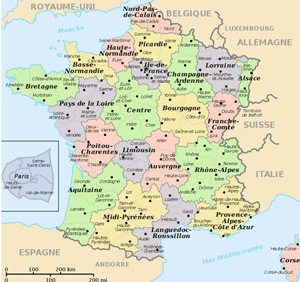
The following article was written by Brian Mulcahy, with the Lee County Library System, and used by permission.
Civil registers are the most important genealogical source in France. Civil authorities began registering births, deaths, and marriages around 1792. Because these records cover the entire population, are easily accessible, indexed, and cover people from all religious denominations, they are crucial to French genealogical research.
Before the French Revolution, France was divided into provinces. In 1789, the new revolutionary government reorganized the country into territorial divisions called departments consisting of 100 departments in France, of which 96 are located within the borders of France and 4 overseas in Guadeloupe, Guyana, Martinique, and Reunion. Each department has its own separate archives apart from those of the French National Archives. Most French records of genealogical value are kept at these smaller archives. Genealogical records can also be located at individual town halls called Mairie. Larger towns and cities are often divided into arrondissements (districts), each with their own town hall and archives.
These records consist of births (naissances), marriages (mariages), and deaths (deces) and are held in Registres d’ etat-civil at the Mairie (town hall or mayor’s office) where the events took place. After 100 years, a duplicate of these is transferred to the Archives Departementales. This countrywide system of record keeping allows for all information on a person to be collected in one place.
The registers include wide margins for additional information to be added at the time of later events. These “margin entries” can include references to other documents on an individual (name changes, court judgments, etc.). Some other unique aspects include the following:
- Beginning around 1897, margin entries often include marriages.
- Divorces were added around 1939.
- Deaths were added (beginning with 1945).
- Legal separations were added beginning with 1958.
The local Mairie and the archives also maintain duplicates of the tables decennales (decennial ten-year index tables), which began in 1793. The Mairie has registered separate alphabetical lists of births, marriages, and deaths. The tables give the day of registration of the event, which is not necessarily the same date that the event took place.
Another source for civil record copies is the Bureau de l’etat civil (local registrar’s office) for your ancestor’s town. This office, usually located in the Mairie (town hall), will usually mail one or two birth, marriage, or death certificates at a nominal charge. Because of the volume of requests, all correspondence should be in French.
Due to privacy regulations, only records over 100 years old may be consulted by the public. It is possible to obtain access to more recent records if you can prove direct descent from the ancestor or family member in question. The local registrar’s office is your only option when searching for records less than 100 years old. The most direct method for success is by birth certificates.
Birth, death, and marriage records in France are full of genealogical information, although the information can vary from various time periods. Later records usually give more complete information than earlier time periods. Most civil registers are written in French. Before beginning any research using French civil records, the genealogist will need the following basic information:
- Name of the ancestor
- Place where the event took place (city, town, or village)
- Date the event took place
In large cities such as Paris or Lyon, the researcher must know the arrondissement (district) where the event took place. If you are not certain of the year of the event, you will have to search in the tables decenennales (decennial ten-year indexes). These usually index births, marriages, and deaths separately, and are alphabetical by surname. From these indexes you can obtain the given name(s), document number, and date of the civil registry entry.
One of the best sources for French civil records outside of France is the Family History Library in Salt Lake City. They have microfilmed civil registration records from about half of the departments in France through 1870, some even up through 1890. More recent records are not microfilmed due to the 100-year privacy law. The Family History Library System also has microfilmed copies of the tables decenales (decennial indexes) for almost every town in France. Since the Fort Myers Regional Library is a registered borrowing library affiliate of the Family History library, researchers may order film through the Family Search website and view it at our facility.
BLM 3/2/2016